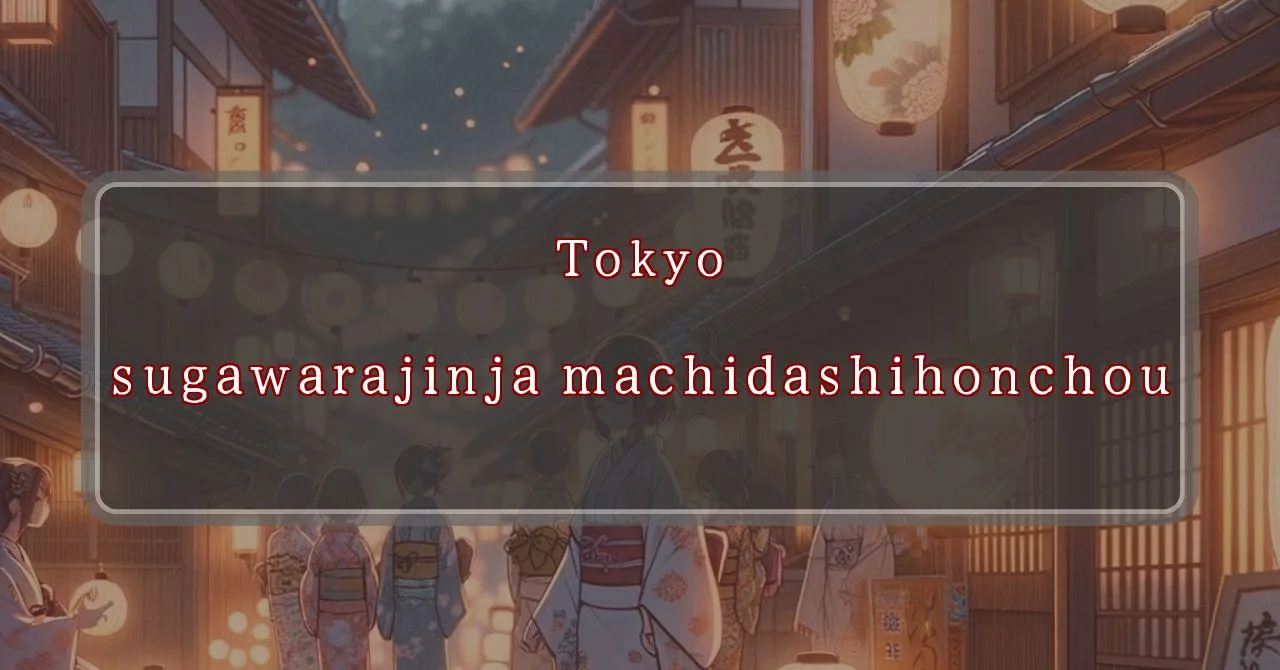Enchanting Shrine Festival in Machida
Basic Information
Sugawara Shrine is a Shinto shrine located in Honmachi, Machida City, Tokyo, Japan.
- Address: 802 Honmachi, Machida City, Tokyo 194-0032
- Phone Number: 042-725-3991
- Access: 10-minute walk from Sugawara Jinja-mae bus stop via Tokyu Bus from Machida Station
- Festival Days: August 25th, 2024
Main Events and Attractions of the Festival
The Sugawara Shrine Festival is an annual event that takes place on August 25th. The festival features a variety of events and attractions, including:
Mikoshi Procession
The highlight of the festival is the mikoshi procession, where a portable shrine is carried through the streets of Honmachi. The mikoshi is decorated with colorful tapestries and streamers, and it is carried by a team of people. The procession is accompanied by music and dancing, and it is a lively and festive event.
Kagura Performance
Kagura is a traditional Japanese dance that is often performed at Shinto shrines. During the Sugawara Shrine Festival, kagura is performed by a group of young women who are dressed in colorful costumes. The dance is accompanied by music and singing, and it is a beautiful and graceful performance.
Food Stalls
There are a variety of food stalls set up at the festival, selling a variety of Japanese dishes. Some of the most popular dishes include yakitori (grilled chicken skewers), takoyaki (octopus balls), and taiyaki (fish-shaped cakes). There are also a variety of drinks available, including beer, sake, and soft drinks.
Games and Activities
There are also a variety of games and activities for children at the festival. These include things like ring toss, beanbag toss, and goldfish scooping. There are also a number of rides and attractions, such as a Ferris wheel and a merry-go-round.
Fireworks Display
The festival concludes with a spectacular fireworks display. The fireworks are launched from a nearby park, and they light up the night sky with their brilliant colors. The fireworks display is a fitting end to a fun and festive day.
Blessings and Deities
The Sugawara Shrine is dedicated to Sugawara Michizane, a Heian period scholar, politician, and poet. Sugawara Michizane is also known as Tenjin, and he is revered as the god of scholarship and learning. Students and parents often visit the Sugawara Shrine to pray for success in exams and school.
- Deity: Sugawara Michizane (Tenjin)
- Blessings: Scholarship, learning, success in exams and school
Origin and History
The Sugawara Shrine was founded in 1630 by Oosawa Genba, a local landowner. Oosawa Genba donated land and a statue of Sugawara Michizane to the shrine. The shrine was originally called Tenjin-gu, but it was renamed Sugawara Shrine in 1902.
- Founded: 1630
- Founder: Oosawa Genba
- Original Name: Tenjin-gu
- Renamed: 1902
Tips and Notes for Visitors
Here are some tips and notes for visitors to the Sugawara Shrine:
- The shrine is open daily from 9:00 AM to 5:00 PM.
- Admission is free.
- There is a parking lot available for visitors.
- The shrine is a popular destination for students and parents during exam season.
- There are a number of restaurants and shops located near the shrine.
Parking Information
There is a parking lot available for visitors to the Sugawara Shrine. The parking lot is located a short walk from the shrine.
- Location: A short walk from the shrine
- Hours: 9:00 AM to 5:00 PM
- Fees: Free
Popular Stalls and Food Carts in Recent Years
| Type of Stall | Description |
|---|---|
| Takoyaki | A staple at Japanese festivals. Characterized by a crispy outside and a creamy inside. |
| Jaga Butter | A simple yet popular snack of hot potatoes lavishly topped with melted butter. |
| Baby Castella | Small castella cakes, sweet and fluffy treats enjoyed by children and adults alike. |
| Grilled Ayu with Salt | Fresh ayu fish grilled whole with salt, a savory taste of Japanese summer. |
| Shaapin | A unique gourmet item influenced by foreign cuisine, with a chewy skin wrapping the filling. |
| Okonomiyaki | A Japanese grilled dish where you often choose your own ingredients for a personalized flavor. |
| Cotton Candy | A fluffy, sweet snack that’s extremely popular with children. |
| Chocolate Banana | A banana coated in chocolate, a fun and visually appealing dessert. |
| Kushiyaki | Various types of ingredients skewered and grilled, an easy-to-enjoy snack. |
| Yakisoba | Fried noodles mixed with a special sauce, a fast food favorite in Japan. |



